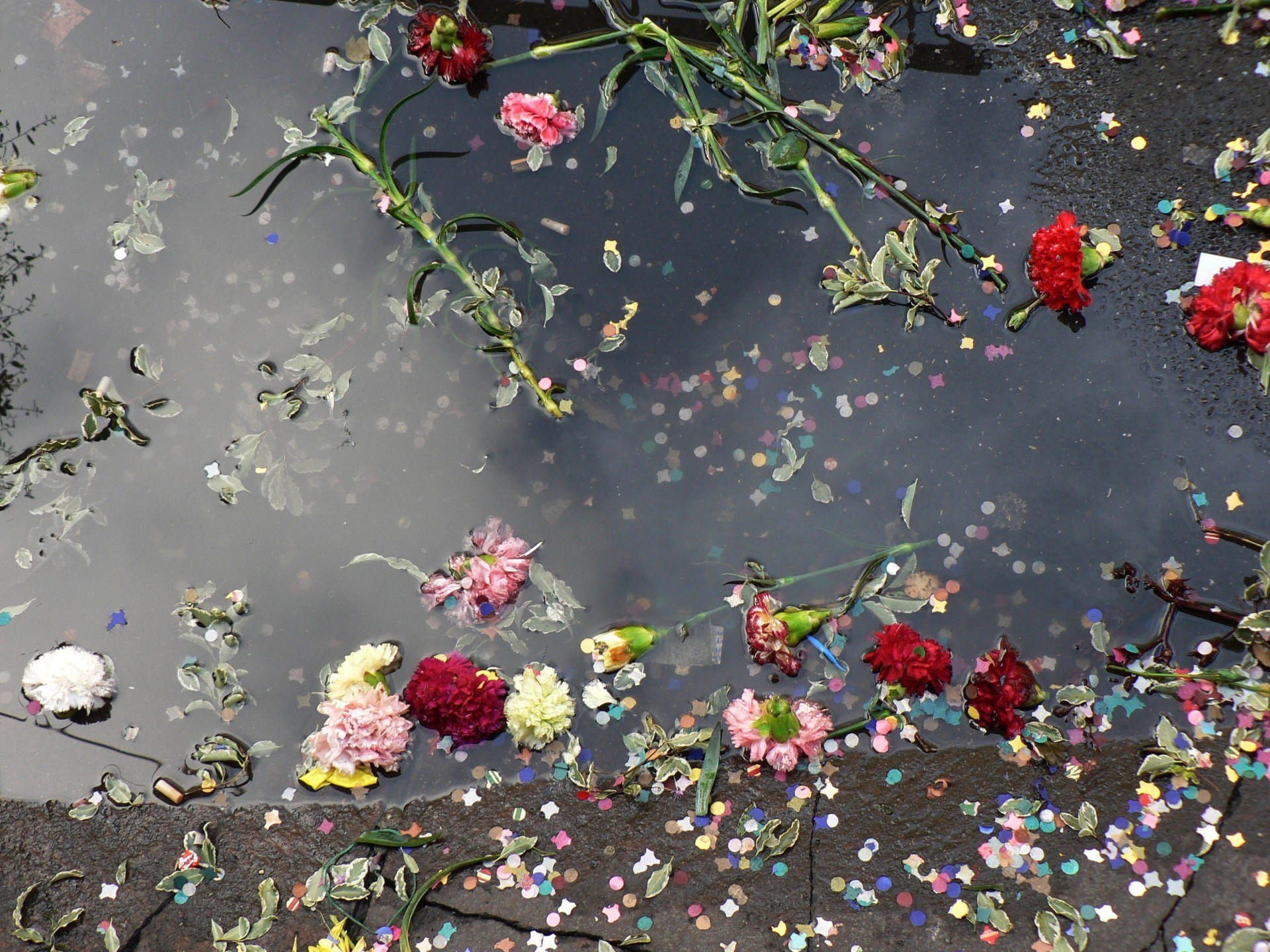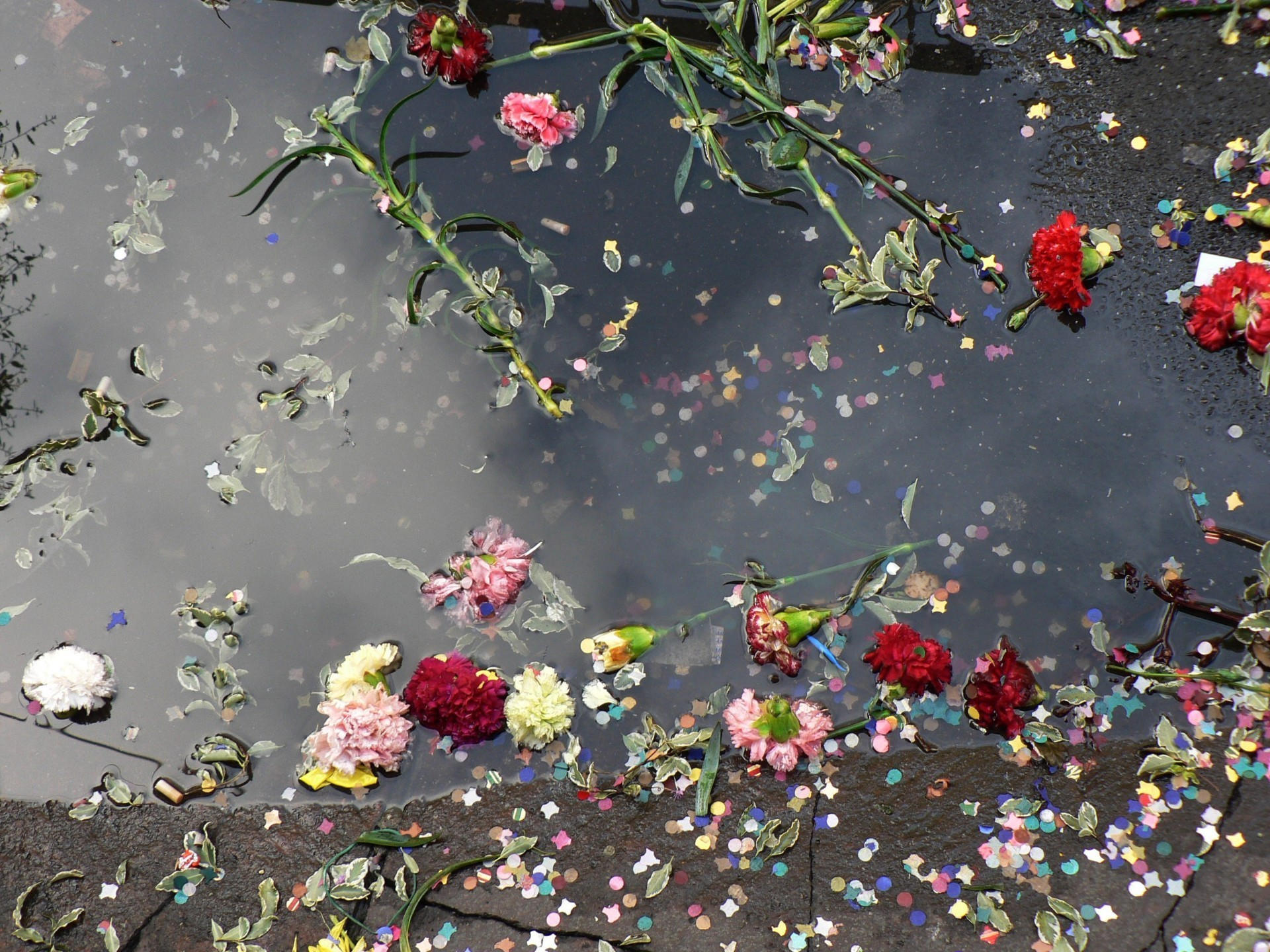Words, Stronger than Bone: Poetry as Public Experience
July 15th 2018 · Valerie Wu · 1004 words
Where I come from, there is no segregation of language. Words are ghosts; ghosts are words. Each one is intricately related to the other.
The country I grew up with was one which no words could possibly translate. As the daughter of Taiwanese immigrants living in Silicon Valley, I was familiar…
Pride Month Poetry
June 30th 2018 · Shekinah Vera-Cruz · 1015 words
For the past thirty days, to celebrate #PrideMonth , over on our Twitter, we've been sharing some our favourite poems by LGBT+ authors. We love diverse poetry here at the Annals & we love their poets even more. We've decided to give a quick rundown of our list in case you missed it, or if you…
The Anatomy of Desire: A Poetry Anthology
June 19th 2018 · Shekinah Vera-Cruz · 523 words
In further exciting news for the month of June, we've decided that in lieu of publishing a November or December collection, we will instead be releasing a poetry anthology — submissions to which will be open to all. The collection is currently set to be released on the 30th of November & submissions will…
Welcome back
June 1st 2018 · Shekinah Vera-Cruz · 303 words
Welcome to The Poetry Annals website. If you're a previous visitor here, it's surely undergone some changes since you saw it last. If you're new—welcome! I hope you like what we have to offer you. We're an small, independent publishing press located in Oxford, in the United Kingdom, founded in early November of 2017. We publish small…
Imaginary Boundaries: Poetry as Performance Act
February 15th 2018 · Valerie Wu · 1246 words
I was watching Brooklyn the other day. The colors were pretty—pastel. Saoirse Ronan walked onto the boat, green and meek. She came out still green, but more of a warrior than before. There were montages of block buildings, brick buildings, Irish dances, songs of home and sicknesses of. The…
The Language of Poems in Self-Expression
January 15th 2018 · Valerie Wu · 1337 words
Last fall, I taught the creative writing workshop “Made in America: A Transcontinental Exploration of Race, Culture, and Identity,” as part of For the Sonorous’ four-week series for female students of colour. We wanted to discover a new language to think about race as a means of individualism, and…
Words, Stronger than Bone: Poetry as Public Experience
July 15th 2018 · Valerie Wu · 1004 words
Where I come from, there is no segregation of language. Words are ghosts; ghosts are words. Each one is intricately related to the other.
The country I grew up with was one for which no words could possibly translate. As the daughter of Taiwanese immigrants living in Silicon Valley, I was familiar with the language of generations present and past. Native Mandarin speakers call us ABC, or American Born Chinese. The first letters of the English alphabet are used to describe the second generation of the Chinese that speak English, and this juxtaposition of languages and identities resonates with the youth community.
Yet the words we use to describe spheres of influence is flawed; language is our collateral damage. Diaspora is a public space and a public experience if you make it. Even today, second generation Chinese American youth struggle to find a language that can express who they are. When English is a language that has promoted hate crimes (Vincent Chin, 1982), and exclusion acts (Chinese Exclusion Act, 1882), it becomes even more necessary to reclaim our humanity in a country that has only ever struggled to dismantle it.
In this deconstruction of language, it becomes even more difficult to find where one belongs. And so the many today turn from one country to another, one identity to another, until we find a way to reshape and reform our own narratives.
The following poems, for me, represent how true authenticity comes from acknowledging that an individual’s experience may have occurred in a language other than English, but is just as valuable.
Dunya Mikhail, “The Stranger in Her Feminine Sign”
Iraqi-American poet Dunya Mikhail was a translator before she was a writer, which is why I think her work speaks of what it means to live in a hyphenated identity of color. Her poems address war and exile in a seeming act of resistance. In “The Stranger in Her Feminine Sign,” she begins:
Everything has gender in Arabic. History is male. Fiction is female. Dream is male. Wish is female.
The juxtaposition of these subjects with their genders demonstrates how language can enforce gender roles throughout history. The connotations of each word become uniquely shaped by their identity, which Mikhail weaves throughout the poem in order to emphasize how the public experience of the “feminine sign” is influenced by the words we use to describe it.
Language becomes a liberation space: communities of color become forces of resistance against oppression, in the past and present. A certain kind of precision in language is necessary to voicing narratives of physical lands and imaginary borders, one that Mikhail illustrates here. Later, she states,
Will she complete a verb or a noun phrase—or give a solo, a word complete on its own?
For Mikhail, history appears to impose a dominant narrative that is translated to label and categorize; words can simultaneously dehumanize individuals and provoke empathy for them. This act of translation is cultural amnesia, a struggle for linguistic legitimacy in a country that will never truly understand.
Cornell Pineda, “Apo”
Growing up as a girl of color in a system that left me unable to translate my experiences, I took solace in learning what it was like to live in a safe space, and also what it meant to experience paradigm shifts in that space. It’s no wonder I often gravitate towards Asian American poetry, where the nuances of navigating identity and mother tongues is often portrayed in a way that resonates with the knowledge have of my own heritage.
In “Apo,” which can either mean great-grandmother or God, Pineda writes about returning a grandson and his first prayer:
Apo. Ag-yaman kami. Ik-kan na kami ti gracia. Apo—is a rough, very rough, translation of God / help me find the right words to pray.
A word becomes a ghost of a word; a meaning is a ghost of a meaning. While writing, I often think about youth poets like Kinsale Hueston, who infuse culture in her writing in her depiction of ghosts of an invisible history. Similarly, Pineda addresses the nature of connection: what it means to have a private experience but use a public language to address it. In this way, language acts as a public experience that has a role in understanding culture, religion, and the essential facets that make up identity.
Oliver de la Paz, “Diaspora Sonnet 25”
Where I live, the community’s issues are discussed in Mandarin and Japanese and Korean, sometimes Hakka (a Taiwanese dialect spoken by members who migrated from the north of China in the 12th century) or Taiwanese Hokkien — a plethora of languages that in some ways, almost serve as a ghost for a world where English is dominant. In grocery stores, canned oatmeal milk is underlined with “???” because there is no Chinese term/word for it, and 肉鬆 is translated to “meat floss” because there is no English word for it. But that confusion is the nature of diaspora, which Paz articulates beautifully here.
He writes:
the little song pulsing its staccato cannot explain the day and the day
in what appears to be a representation of an immigrant’s relationship with language. The task of learning a second language is a difficult one, and it is altogether necessary to examine the former, undisturbed experience in a mother tongue as it is to acknowledge its recurrence in another form.
Paz’s statement on language as a music that transcends physical identity remind me of the poet Sappho’s statement that words are stronger than bone. When Sappho asks her reader if she can convey the strength of words through her language, she is also asking if the way we speak can shape our identities — whether it is reclaiming the languages that were taken from us or educating others on the significance of resistance today.
Words — and the ghosts they form — are resistance, as Paz almost implies within the context of his narrative. They are “more resilient than sinew” and more “sensitive than nerve”. With words, we begin to rise. With words, we speak volumes.
Pride Month Poetry
June 30th 2018 · Shekinah Vera-Cruz · 1015 words
For the past thirty days, to celebrate #PrideMonth , over on our Twitter, we've been sharing some our favourite poems by LGBT+ authors. We love diverse poetry here at the Annals & we love their poets even more. We've decided to give a quick rundown of our list in case you missed it, or if you don't fancy scrolling through a twitter thread thirty tweets long.
I. Tyler Tsay, 'notes on origin story', in underblong issue #1 (June 2017).
to forgive
to forgive is a brutal word.
is swimming in your own blood to survive.
II. Lydia Havens, 'in the seventh grade, Delaney taught me the term "pancake nipples"', in Up the Staircase issue #40.
like the world's
worst secret i turned to face the full-body mirror
and nothing shattered but nothing kept itself together
either my body couldn't stop rising
III. Chen Chen, 'Quantative Reasoning', in The Shade Journal.
It's never too late for someone else to have your happy childhood.
IV. Topaz Winters, 'Trigger', in Glass: A Journal of Poetry (October 2017).
Yes, I love the girl. I love her like
glowing in the dark. I love her like animal. I love
her like shotgun to my chest
V. Caleb Lovelace, "Examinations", in Bombus Press issue #5.
a heart, in four pieces.
hyacinths in all shades of mourning.
wings of various species.
VI. Richard Siken, 'Dots Everywhere', in BOAAT Press.
None of it is
real, darling. I say it to you. Maybe we will wake up
singing. Maybe we will wake up to the silence
of shoes at the foot of the bed not going anywhere.
VII. Yves Olade, 'Something I'd Lie About', in Kingdoms in the Wild (August 2017).
you wanted to love
him in a way that didn't hurt & now you know
that isn't love at all. sometimes, you still want it.
VIII. Terry Abrahams, 'explaining thunder to someone who has never heard it', in By & By Poetry issue #8.
sometimes even the most open spaces
cannot carry sound
IX. Logan February, 'Sober II (Melodrama)', in Occulum Journal (January 2018).
I streamline my whole
obsession, go full crazy & start
to crave death again. Wash dirty
hands with dirty water.
X. Juniper Cruz, 'even though sunday isn’t our holy day, boy', in the Rising Phoenix Review (August 2017).
today, you are heaven’s threshold,
a garden of prayer, a paradise
that I would like to die into.
XI. torrin a. greathouse, 'Self-Portrait as Kindling Model of Hypomanic Symptoms', in the Ellis Review (May 2017).
after all what is a sun but every possible thing
burning?
XII. Matty Layne Glasgow, 'I fell for Christian Slater', in Cotton Xenomorph (March 2018).
I always found comfort in sharp shiny things handled
with care
XIII. Paige Lewis, 'Diorama of Our Need to Escape the Cold We Make', in Pleiades Mag.
Now red. Now waxy. He
ribbons it through his lips. See, he says. His singed
mouth. We’ve grown so big.
XIV. jayy dodd, 'narcissus #17', in The Shallow Ends (April 2017).
every so often / taking a break / to remind me / it knows i listen.
XV. M. McCoy, 'Bile', in Tongue Tied Magazine (January 2018).
I sleep with the wolves.
Bleach white winter moon,
night sky gorged with stars.
XVI. Sage, 'FOR THE BOY WHO TAUGHT ME HOW TO SAY UNFINISHED', in Vagabond City Lit, issue #24 (October 2017).
a boy weeps
a river a boy weeps a truth true
XVII. S. K. Grout, 'Wanderlust and the Dissonance of Memory', in L'Éphémère Review #issue 7, (October 2017).
I marvel
that it has taken thousands of years for science to
catch up to myth
XVIII. Frank O'Hara, 'Meditations in an Emergency', in The Collected Poems of Frank O'Hara (1995).
I am always looking away. Or again at something after it has given me up.
XIX. Alain Ginsberg, 'Self Portrait as Waluigi', in Peach Mag, season 2.
If you know me a frame, you can call me mirror.
If you walk through me name me door.
XX. Kristin Chang, 'DREAM OF ANGEL ISLAND (OR: HOW TO FALL IN LOVE W/ A WHITE GIRL)', in The Shade Journal, issue #2.
your body stores its own collapse. Remember this. Remember this
XXI. Joseph Jordan-Johnson, 'Shower', in The Jackalope (February 2015).
It is hot,
in the way that pain cries.
Holy, in God’s new breath,
XXII. Ally Ang, 'The Walk Home', in The Fem Lit Magazine (May 2016).
Do not tell me about the danger.
I was born to a home filled with ghosts
and I am still digging up dead things
with every step.
XXIII. Rosebud Ben-Oni, 'I Guess We’ll Have to Be Secretly in Love with Each Other & Leave It at That', in Frontier Poetry (November 2017).
To love as resistance
but not always the way back. To can’t I can’t I. To you
XXIV. Jody Chan, 'flying lessons', in Crab Fat Magazine.
where the only stranger to our bodies is gravity
XXV. Marylyn Tan, 'THE WAY WE DID IT', in yell/shout/scream, the Archive Issue.
refusing to smoke out the forest fires,
taligating, shoplifting
looking every horse in every mouth?
XXVI. Chrysanthemum Tran, 'Binge', in Muzzle Magazine (June 2017).
i’m so fish, i’m drowning on land. i’m so fish, people don’t even know which way i’m swimming.
XXVII. Joshua Jennifer Espinoza, 'I IMAGINE ALL MY CIS FRIENDS LAUGHING AT TRANNY JOKES', in Apogee Journal (June 2016).
There is nothing I love more than an honest storm. Broken dishes.
Dead grass. The time has come for me to be alive
and for you to stop speaking.
XVIII. Joanna C. Valente, 'My Vagina Will Be the Death of Me', in Tinderbox Poetry Journal.
Part of surviving
is to keep moving
XXIX. Julian Randall, 'Abuela Dice Que Spilled Salt Goes Over the Shoulder', in the Adroit Journal, issue #20.
salt is always hungry
salt is what made the men forget
their country had a name
XXX. Richard Siken, 'Saying Your Names', in Crush (2004).
Here is my hand, my heart,
my throat, my wrist. Here are the illuminated
cities at the center of me, and here is the center
of me, which is a lake, which is a well that we
can drink from, but I can’t go through with it.
I just don’t want to die anymore.
The Anatomy of Desire: A Poetry Anthology
June 19th 2018 · Shekinah Vera-Cruz · 523 words
In further exciting news for the month of June, we've decided that in lieu of publishing a November or December collection, we will instead be releasing a poetry anthology — submissions to which will be open to all. The collection is currently set to be released on the 30th of November & submissions will be open between July 1st and August 31st. You can learn more about how to submit here.
This decision has been taken for a number of reasons. Firstly, as a student entering their final year of university, I won't have much time this coming autumn to be publishing collections monthly. This means that from November until July of next year (at the very least), The Poetry Annals will be on hiatus. We'll still be around on Twitter & promoting the work of our authors, but we won't have the manpower capacity to continue publishing during this period.
While it would theoretically be possible to produce collections during this very busy and stressful time, our commitment to the authors we publish and to the craft itself means that we're dedicated to maintaining high levels of engagement with the works and the poets themselves. This is highly rewarding, but also time consuming, and time will be in very short supply in the final nine months of my degree.
Running The Poetry Annals has really been a joy, and we've received truly heartening amounts of support — each of our collections has been downloaded, on average, more than a hundred times; with many collections far exceeding that. In return for this support, we'd love to give something back to the poetry community that's been so warm and welcoming.
This brings us to the second reason for ending the year with an anthology. We're fully aware that publishing only one poetry collection a month severely restricts the number of people we publish overall, and forces us to be highly selective with the works we choose. While this means that we publish some really wonderful work, it also means that we end up rejecting a lot of poetry that we really like. An anthology seems like a perfect way to thank the poetry community, draw submissions from a wider group of people & publish even more wonderful poetry.
Thirdly, we see this anthology as a way to give back more widely. The intended pricing for the anthology as it currently stands is:
PDF/eBook — £1+ (minimum donation)Paperback — £9.99
All profits from the sale of the anthology (after production & distribution costs) will be donated to Save the Children, a wonderful charity that works for the rights of children around the world to safety, family and education. From atrocities at the US-Mexico border to the famine in Yemen, you can find out more about the work that Save the Children do on their website.
Many of our published authors will be involved in this project, and we can't wait to share it with you & do some social good in the process. While we're sad to be taking such a long break, we're looking forward to what The Anatomy of Desire: An Anthology has in store.
All the best,
Shekinah Vera-Cruz
Editor-in-Chief of The Poetry Annals
Welcome back
June 1st 2018 · Shekinah Vera-Cruz · 303 words
Welcome to The Poetry Annals website. If you're a previous visitor here, it's surely undergone some changes since you saw it last. If you're new — welcome! I hope you like what we have to offer you. We're an small, independent publishing press located in Oxford, in the United Kingdom, founded in early November of 2017. We publish short poetry collections, or pamphlets, on the 28th of the month, and plan to do so for every month of 2018.
We're a small team who are all super busy with our own projects. You might think our output is small, but we put a lot of love & care into what we do. We really love poetry & we want you to love the poetry we produce. Our authors are definitely at the heart of everything that we do. We work really hard to accommodate and match their vision, in return for being trusted with their words. We know how nerve-wracking releasing your poetry out into the world can be, and we want to make this process as smooth as possible.
While the website is now up and running, we're working on a few other new things. We're getting our Instagram all set up & are also working on bringing back our monthly poetry reviews — so stay tuned! We'll also be doing some fun stuff on our Twitter for #PrideMonth2018 & have a cool surprise in store for when we reach 500 followers. If you'd like to get in touch with us for whatever reason, just send as a message on Twitter or email our Editor-in-Chief, and we'll get back to you as soon as possible.
We're happy to have you with us along for the ride.
Welcome to the Poetry Annals family.
All the best,
Shekinah Vera-Cruz
Founder & Editor-in-Chief
Imaginary Boundaries: Poetry as Performance Act
February 15th 2018 · Valerie Wu · 1246 words
I was watching Brooklyn the other day. The colors were pretty — pastel. Saoirse Ronan walked onto the boat, green and meek. She came out still green, but more of a warrior than before. There were montages of block buildings, brick buildings, Irish dances, songs of home and sicknesses of. The lines between countries started out straight, then blurred.
I began to think that maybe all boundaries are imaginary; they don’t exist unless you make them. In the film, New York was big and bright, shining. (Welcome to America.) But sometimes stories, like cities, are half-formed. Sometimes there are too many streets and lines, and too many people waiting. You realize that just because you’re in a big place doesn’t mean you’re a big person. Sometimes your dreams are greater than yourself. Then you remember that Lady Liberty was green and meek when she was half-formed. And after formation, she came out still green, but more of a warrior than she was before.
That was poetry for me in its many forms; a form of expression on paper, but in reality a performance act: of displacement, of immigration, of diaspora. Words and images are not isolated experiences.
On February 16th, I celebrated Lunar New Year with my family. Many don’t realize that this is an inherently political act. It is a form of resistance to be able to live in a country that has too many streets and lines and too many people waiting. It is a form of rebellion to engage in cultural traditions that reinforce a collective identity. It is a revolution to be able to come out still green, but more of a warrior than before. That’s what the following poetry pieces have conveyed for me: a personal identity shaped by living on a global stage, with a backdrop of the human imagination.
Sheng Kao, “First Mid Autumn Festival Away From Home”
Kao writes:
Second diaspora barely mine. A home / not our heavy tongues / cradling a sliver of yolk, our own waning moon to pierce shrouded night
in her mediation on tongues. Her language is her migration. She is under the sight of a moon that watches over her home, which is not really a home. It’s in these legacies of words — the careful curation of tongues and accents — that the reader becomes a witness to the influence of language over time. Countries bleed into borders, and over them.
From the use of language as a form of communication to a metaphor for a lack of agency, Kao alludes to the origin story of Chang’e through the “small kingdom of a mountain’s spine” and the “ladder to the moon”. Chang’e was a woman who drank an elixir of immortality in her eagerness to gain everlasting life. In the Chinese myth, drinking half of the elixir would grant immortality, while drinking the entire potion would cause one to ascend to heaven. Because Chang’e drank the whole potion, she was condemned to live out her entire immortal life on the moon — drifting — but always rooted in one place.
Kao likens the speaker of the poem to Chang’e in this aspect, drawing comparisons between the assimilation and alienation of an immigrant in a foreign country. At the end of the poem, she questions the reader with:
how many migrations does my body possess? Is it my viscera?
The question is more rhetorical than one to be explicitly answered. We learn that the multiplicity of language, identity, and bodies is internal; an elixir that has made its way through our veins. We learn that like a viscera, migration is a show that is always going on: in the way we speak in multiple tongues, in the way we seem to observe ourselves at a microscopic level, and in the way we present ourselves. Our identity is fundamentally shaped by the borders it takes form in, and this narrative of expatriation reclaims it beautifully.
Jihyun Yu, “Immigration II”
Jihyun Yun’s “Immigration II” is a separation of languages that speak to one another. She chronicles the complex Korean American experience through a young mother forced to give up her “Oriental” name for one more American, the lunchboxes she prepares, and the home she creates. “Dear 선주,” she writes, “be proud of what they try to efface.”
This is in itself a kind of performance — one of patriotism. The subject of Yun’s poem adopts another flag, both intentionally and unintentionally. A process of assimilation occurs at center stage, while alienation retreats backstage, not obvious but still present.
The problems this presents can be translated into multiple languages. In French lessons, we learned the differences between l’assimilation and l’alienation, le nationalisme and le patriotisme. The conclusions we came to were that l’assimilation is an immigrant fitting into the setting [Chinese (minority) → English (majority), English (majority)] l’alienation is an immigrant not fitting into the setting [Chinese (minority) → English (majority), Chinese (minority)]. Le nationalisme was America > China, America > France, America > every country in the world. Le patriotisme was America, America, America.
Yun’s poem begs the question: to what extent can we mutter our birth-names while adopting another? How many times can we say America, America, America before we forget the country that was there before? Can we ever become people of two countries without forgetting what separated them in the first place? Or are these boundaries ones that we created for ourselves through our languages?
Tenses transcend time; representation of one culture is at once misrepresentation of another. These words speak volumes to our larger role in society as not only immigrants, but individuals living in a society where personal autonomy is a product of our own inclusion.
Courtney Sina Meredith, “Could You Connect Me to a Diverse Community”
Our thoughts are shaped by our communities as much as they are anything else. In this erasure poem that physically takes hold of the levels of racism, Meredith compels us to think about the way our community has influenced the rose-colored lens through which we look through.
“I am aware of my privilege,” Meredith begins, “could you connect me to a diverse community?” The poem then proceeds with a word being deleted from each line, compelling the reader to focus more on the individual meanings of each, rather than the collective meaning. Through each line, we begin to see our roles within the wider context of our communities, and our communities in the wider context of society. Each room is located within another room, and only by demolishing them can we fully contextualise ourselves on a wider scale.
The dialogue that shapes our communities is fundamentally altered with time. “Could you connect me to a diverse community?” conveys an uncomfortable silence through the visual presence of black ink and unanswered questions. We wonder if the lines between communities are straight or blurred. If they are blurred, maybe it is due to our own perceptions, rather than to physical boundaries.
The repetition of “diverse community” that lasts until the second-to-last line of the poem reiterates our own connections to the structures that have held us in place. The reader is never told what defines a “diverse community,” or how it is connected to the speaker of the poem, who remains ambiguous. While this serves to alienate the reader from the question, it also forces a kind of self-consciousness: are we aware of our privilege? Can communities truly ever be “diverse?” Or are they merely products of our own imagination?
The Language of Poems in Self-Expression
January 15th 2018 · Valerie Wu · 1337 words
Last fall, I taught the creative writing workshop “Made in America: A Transcontinental Exploration of Race, Culture, and Identity,” as part of For the Sonorous’ four-week series for female students of colour. We wanted to discover a new language to think about race as a means of individualism, and as a means of universality.
As an Asian American female, the way I think about poetry has been fundamentally shaped by the racism that I’ve seen through both my own eyes and the eyes of others. Invisibility is a reality for me; I’ve turned to writing as a form of activism in order to converse with others about the decolonization of identity, and in effect, the reconsideration of cultural heritage and historical roots. For the students of color I worked with, the goal was to promote humanistic values through the overarching concept of ethnicity.
Precise language has always been key to this. In my first forays into poetry, I was consistently told to “show, not tell” an immigration narrative. Instead of narrating the hardships of meiguo, “beautiful country,” I was taught to develop nuance in the way an Asian American family would take their shoes off before entering the house, or how the addition of the four tones (of the Chinese language) would possess much more resonance than a lengthy description of them would. I learned that poetry isn’t just the shorter medium of prose, but is instead much more intense, distinct, and precise.
In 2018, poetry is even more important than ever — as a form of protest and resistance for marginalised writers, but also as a form of expression. To these writers of colour who bring truths compellingly to light, language play a formative role in their development as artists, but an even larger role in their narratives as a whole.
Hanif Abdurraqib, “NONE OF MY BLACK FRIENDS WANT TO LISTEN TO DON’T STOP BELIEVIN’”
The most recent feature in Winter Tangerine Review’s “Lineage of Mirrors” series for writers of color, Hanif Abdurraqib’s “NONE OF MY BLACK FRIENDS WANT TO LISTEN TO DON’T STOP BELIEVIN’” depicts the everyday nuance of bodies. The entirety of the poem itself seems to be a protest to just listen. It isn’t so much about the music as it is about the community that the music inhabits: the “we” that doesn’t “sing where we sin” or “lock arms”. This description of “otherness,” but “otherness” together is representative of not a singular narrative, but a collective one.
Abdurraqib’s writing reminds me of an essay by Toni Morrison (“The Color Fetish” in The New Yorker). Morrison writes that she attempted to incorporate a form of racial erasure into her later writings, as opposed to the “strong black narrative” she was so praised for in The Bluest Eye. While colorism was a focus point, the aspects she wanted to convey were deeper, and writing explicitly about color wouldn’t have accomplished that. So, she states, her use of “racial erasure” wasn’t a marketing endeavor, but one of subtle truth.
While there is no explicit mention of race except in the title, Abdurraqib adopts this mechanism of writing about color without truly writing about it. In Morrison’s terms, the literary technique of writing about race is an “explosion of racial identification”. In Abdurraqib’s poem, it is the elision of race, and the wider implications that result from that erasure. The language of the poem is a way of reiterating our humanity as well as defining it for ourselves.
Teng Qian Xi, “Three Poems”
Singaporean poet Teng Qian Xi writes compellingly about sight in her three poems “Body,” “Reconfiguration,” and “Glass” as part of a larger portfolio in the Asian American Writers’ Workshop. “Body” focuses on the prepositions used to describe sight. We look behind us at mirrors; we gaze at the gazes of others. Their lives flow into ours as a result of us seeing them. Xi weaves a narrative of the stories we pass on to one another through our eyes — the “windows to the soul.”
“Reconfiguration” tells us how that sight is shaped. In this diagnosis, Xi draws on the symbol of the night sky to further develop her portrayal of sight: not simply direct, but through a telescope. There is a necessary distance between us and the planets, but at the same time our gaze makes them feel closer. Stars and humans are not so disparate after all. By the end of the poem, stars are witnesses to us just as we are witnesses to them. The distance becomes less defined.
Xi’s ability to effectively weave metaphors is very much integral to her ability as a writer: “Glass” centers in on transparency, and its significance as a means of vision. In this poem, I particularly appreciate Xi’s ability to model her images after her words. Because “glass” evokes imagery of looking beyond, Xi uses a “window-observation” method to depict what the transparent means to her: protection, survival, fragility. From the metaphors she incorporates into her poetry, the reader learns that the transparent too, occupies space, though we often forget it because of its invisibility — almost as if it was a metaphor for identity.
Franny Choi, “Quarantine”
Franny Choi’s writing never ceases to amaze me in the preciseness of her language. In “Quarantine” we have the story of boundaries, but also the implications of those boundaries. The juxtaposition of disease and cleanliness is used to further the idea that the narrator has become disassociated with what has been affecting the population. The phrases Choi uses to describe this phenomenon is direct — “stones that formed in the child’s body” — and enhances the effect of the isolation the narrator has subjected herself to: both a physical and figurative quarantine.
Chen Chen, “The School of Night & Hyphens”
The title of Chen Chen’s poem is a demonstration of the poem’s overall tone. When I first read “The School of Night & Hyphens,” I automatically assumed that it was a metaphor for a hyphenated identity — the feeling of blindly fumbling one’s way through the dark in order to discover a true nationality. Yet after reading it multiple times, I’ve started thinking that it is more a poem of proportions, or relationships. Chen writes:
But the people, as usual, replete with people. & so you, with your / headset, sit in the home office across the hall.
Here we have this sensation of isolation in terms of who the protagonist is, and the people of people of people that surround him. Perhaps this is the real night, the night of taking form in one’s own shape, rather than the shape of others. In the next few stanzas, he deliberately characterises the poem’s focus — “you sings the chorus too soon, you makes a killer veggie taco, you played tennis-in-college” — that plays with tense and language in ways that serve to surround identity and define it.
I once read an interview with five Asian American authors (Nicole Chung, Karissa Chen, Cathy Linh Che, Ari Laurel, and Christine Hyung-Oak Lee) in which each of them was asked to define what constitutes uniquely Asian American writing. And though there were many differing opinions on the exact aspects of it, the consensus was clear: Asian American writing is written by Asian American writers. There are no thematic boundaries. And here in Chen’s writing, the relationship between words and phrases comes through clearly without any indication of ethnicity or race. The connections between words and hyphens is something that Chen plays with and adapts to fit his own style of writing, which to me is perhaps the greatest form of self-expression.
Umang Kalra, “Berlin”
The cities that shape us have an undeniable impact on the people we become. This is what Kalra demonstrates here: she writes a negative perception of cities and then proceeds to deconstruct the notion of them as they relate to her own human fragility. “Berlin” is a powerful meditation on both the micro and the macro of urban communities, and the relationships they have to the people who inhabit them.











